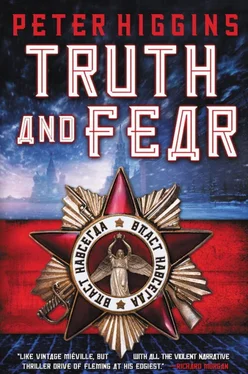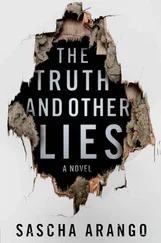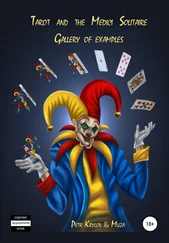Fohn would make the speeches. Reading the exequies of the lost leader. Chazia had not objected. Let Fohn lick the dead man’s arse; she wouldn’t wrap herself in his corpse-shroud. They would know her for other reasons soon enough.
Behind the Four on their chairs, Fohn had hung immense waterfalls of red and black fabric and, bathed in a golden spotlight, a portrait of the Novozhd fifty feet tall. Fine words picked out in letters of gold.
WE WILL REMEMBER HIM, AND IN REMEMBERING, VICTORY!
STAND TOGETHER, CITIZENS, AGAINST ENEMIES WITHIN AND WITHOUT!
Beneath the platform the corpse itself was displayed. It lay on crimson silk in an open casket of black wood polished to a mirror shine. The embalmers had done their work thoroughly: repaired his bomb wounds, given his face a waxy apple flush, blacked and glossed his hair and moustache. A man in the prime of life. The image of his portrait. Only the drab khaki uniform that Fohn had insisted on– We must remember, colleagues, that we are, after all, in a state at war –spoiled the fine effect. The four mudjhiks faced outwards, one at each corner of the catafalque, motionless and watchful, the colour of dried blood.
From the Thousand Year Hall, after the funeral, the body was to be carried in solemn procession to the Khronsk-Gorsk Mausoleum. Factories had been closed for the day so the workers could line the avenues for the cortège. Free meals were being served at the municipal canteens. On the way to the funeral Chazia had seen huge crowds of people in mourning black. Karetas, droshkis and cars, black ribbons and pennants fluttering.
Chazia’s attention was fixed on the crowd in the hall. The first rows of seating were reserved for war veterans. They sat in rigid silence, holding up their crutches, pointing with them towards the leaders on the podium like arms raised in salute. And behind them, row after row, dissolving into shadow, one hundred thousand persons dressed in black with touches of red, standing to attention in perfect rank and file, not one speaking a word. So many feet, so many shoulders, so many lungs breathing. The noise of a hundred thousand silences–the small shuffle for balance, the rub of cloth against cloth, the swallow and stifled cough–roared against the platform like the sea. One hundred thousand faces, one expression. The sombre gravity of grief. It was one body. One mass . It had heaviness. Inertia. An existence all of its own. It was the Vlast.
Chazia pictured how it would be when she stood alone before them, speaking in a fine clear amplified voice. Two hundred thousand shining eyes fixed on her. The roar of their cheering. The rhythmic stamping of two hundred thousand feet. They would chant her name. She would throw her arms wide to embrace their acclamation, and her hair would lift and stir in the wind of their breath.
In the Thousand Year Hall, the waiting dragged on too long. The hundred thousand people waited. On their platform the Colloquium of Four waited. Dead time. Chazia felt the mass dissolving. Atomising. A hundred thousand separate thoughts. Fucking Fohn. He was surely finished after this.
There was a deep loud crash from outside the hall. Another. And another. The distant explosions roared on and on, ceaselessly, merging into a rolling brutal thunder. The veterans were standing to attention, right hands clenched against their chests. Somewhere in the crowd a woman was screaming. The Archipelago! The Archipelago has come! But it was only the five hundred guns of the fleet at the Goll Dockyards doing their bit.
At last the thundering guns subsided into silence and a magnified rustling came over the tannoy. The Combined Services Orchestra in the gallery was getting ready to play. Chazia could see them across the vastness of the auditorium, minute figures in a splash of stark white light for the kinematograph camera. When Colonel of Music Vikhtor Vanyich Forelle raised his baton, all other lights in the hall fell dim. Everything disappeared in shadow, apart from the orchestra and the corpse itself, isolated under a single spotlamp. The effect drew murmurs of appreciation from the mourners. Well done, Fohn. They can’t see us at all now.
The music began. The slow movement from Frobin’s Lake Horseman Suite. The massed voices of the Navy Choir singing the ‘Blood of Angels’ chorus from Winter Tears .
Vlast! Vlast! Freedom land!
My heart a flag in winter–
The drum of my blood
In storms of rain.
Music was of no interest to Chazia. She waited for it to end.
Someone edged across the platform towards her, taking advantage of the dimness that hid them from the hall. It was Iliodor. Ignoring Fohn’s ostentatious disapproval, he crouched behind Chazia and whispered in her ear.
She smiled.
‘Good,’ she said when he had finished. ‘Good. When you have her, bring her to me.’
Lom pulled the envelope from the back of the bloody couch and ripped it open. It contained a sheaf of glossy monochrome photographic prints. He shuffled through them quickly. He knew what they were. Vishnik’s Pollandore moments, the photographs taken with his beloved Kono on his long wanderings around Mirgorod. Photographs of moments when the world broke open and new things were possible. He’d kept them safe at the cost of his life.
Lom sat back, flooded with disappointment.
‘There’s nothing new here,’ he said. ‘We’ve seen all this before.’
‘Maybe he saw something else in them,’ said Maroussia. ‘Something specific. Something we missed.’
‘It’s possible,’ said Lom. ‘I guess.’
‘So let’s have another look.’
Maroussia spread the photographs out on the floor and they went through them together. Most were gentle, beautiful images, full of an oblique magic: sunlight on a street corner, ripples in a pool of rain, the way light caught the moss on a tree. Some were passionate, dramatic, apocalyptic even: the curtain torn aside, the whole of the city ripping open at the seams. The people in them knew what was happening to them. They looked into Vishnik’s lens, their mouths open as if they were laughing, their faces filled with ecstatic joy.
Sorting through the pictures, Lom felt a sharp pang of loss. He felt the loss of Vishnik, and also of the city as Vishnik had seen it. Vishnik’s Mirgorod was beautiful: these things happened and were perhaps still happening, somewhere in the city, but Lom had never seen them. For him too the city had opened to show him glimpses, possibilities, but he saw blank-faced buildings, a tower half a mile high crowned with an immense brutal statue of Josef Kantor, the Square of the Piteous Angel crowded with grey withdrawn people, their downturned faces, their drab whispering voices. A future crushed under the weight of its own fear, far heavier even than the weight of the Vlast today. Kantor’s future. Chazia’s future. It had to be stopped, and if he could stop it he would. Maroussia’s way, or his way.
Maroussia picked up a handful of photographs from the pile.
‘These are new,’ she said. ‘I haven’t seen these before.’
‘Show me,’ said Lom.
He went through them one by one. A couple walked naked on the surface of a river, the river glowing with an inward radiant light. A giant stood on a harbour side, silhouetted against the sky, his hair rising in a cloud around his head. A parade marched down a street towards the lens, only the street was above the rooftops and wrapped in chimney smoke and the people carried blazing candelabras and some of them were only heads and had no bodies at all. They were exhilarating, uncanny pictures, but they added nothing. No help at all.
Читать дальше


![Кэмерон Доки - Правда и ее последствия[Truth and Consequences]](/books/79610/kemeron-doki-pravda-i-ee-posledstviya-truth-and-con-thumb.webp)









